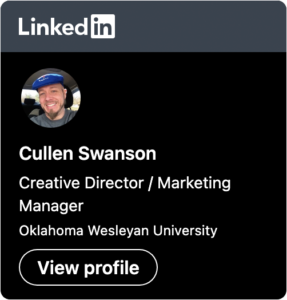Common Mistakes Churches Make Online
Since 2005, I have developed custom websites for churches and ministries all over the world as well as websites for many secular companies. My company’s focus has always primarily been churches and non-profits simply because that’s the world I am most familiar with, and I wanted to offer a quality product to churches that would represent the organization well without charging outrageous prices that churches and ministries often get duped into paying because they don’t know any better.
Over the last 7 years, I have noticed a trend of mistakes that a lot of ministries make in relation to their website and other efforts online that cause an unrealized negative impact. All of them can be easily avoided in order to develop a strong Internet presence that will give the online community you are trying to reach an impression of excellence when they interact with you online.
Content, Content, and then Content
 There’s nothing worse than having a blog on your website that either has no content or has no recent content. If top search engine placement for your website is a concern of yours and you aren’t consistently developing new content for your website, you are missing the mark. A search engine’s job is to provide the most relevant search results based on the search criteria submitted, and fresh, original content (much like you’ll find on this website every month) remains a key component of Google’s algorithm that determines rankings.
There’s nothing worse than having a blog on your website that either has no content or has no recent content. If top search engine placement for your website is a concern of yours and you aren’t consistently developing new content for your website, you are missing the mark. A search engine’s job is to provide the most relevant search results based on the search criteria submitted, and fresh, original content (much like you’ll find on this website every month) remains a key component of Google’s algorithm that determines rankings.
Content is simple to come up with for a church website; the only drawback is finding the time to sit down and create it. It is often difficult to consistently develop weekly or bi-weekly content on websites for service-related companies such as lawn care, plumbing, pest control, or manufacturing—after a while you simply run out of interesting things to write about. But on a church website, you have the Word of God as the only inexhaustible resource in the world at your fingertips to produce inspired content that will feed your flock and keep them coming back for more. Don’t force the members of your congregation to seek other avenues online for teaching resources that will feed them spiritually simply because there isn’t any on your website!
Your church members spend more time online than they do listening to your voice during church services. By not frequently posting new content to your website, you are missing out on an amazing opportunity to stay involved in their lives between your services and capitalizing on a proven approach that will fuel your efforts to equip them for the work of the ministry. People that feel called to your ministry connect with you in part because they feel that they can grow spiritually under your leadership and biblical instruction. Posting to a weekly or bi-weekly blog keeps them connected to the anointing and instruction God has given you that pulls on them to grow spiritually. Additionally, it makes you seem more approachable and personal when they are able to receive from you more than just one or two times a week, especially if the church in question is a large one.
Time and time again, when we develop new websites for churches, the pastors that I consult with love the idea of having a blog. More often than not, however, due to the hectic schedule and commitments that pastors and ministry leaders face, the website is the first thing to take a back seat. Just remember that while your website isn’t getting any attention from you, there are hundreds — even thousands — of hungry people that spend a great deal of time online throughout their daily grind no matter how busy they get. It’s worth the effort to either find time to develop teaching resources online or to have a staff member assist in helping you do it in order to extend the reach of your influence and knowledge to disciple and equip those that are already looking to you for an encouraging word from God.
Spelling and Grammar
 Probably one of the most widely abused items on the list that I have seen over the years is poor grammar, sentence structure, and spelling mistakes. When (not if) you take the time to create meaningful content for your website, have someone that actually paid attention in English class to look it over before you publish it. When you don’t, it makes you appear unintelligent. People can be put off by reading content that is riddled with bad grammar and spelling errors. If there were misspelled words and bad grammar throughout the first paragraph of this article, would you have continued reading? How would it affect your opinion of me? Enough said.
Probably one of the most widely abused items on the list that I have seen over the years is poor grammar, sentence structure, and spelling mistakes. When (not if) you take the time to create meaningful content for your website, have someone that actually paid attention in English class to look it over before you publish it. When you don’t, it makes you appear unintelligent. People can be put off by reading content that is riddled with bad grammar and spelling errors. If there were misspelled words and bad grammar throughout the first paragraph of this article, would you have continued reading? How would it affect your opinion of me? Enough said.
Social Media
 A lot can be said about social media, but one question I hear over and over is, “How do I get people to connect with my church’s Facebook page and to follow us on Twitter?” How many times do you see people that you are connected with on Facebook post links and inspiring quotes to articles from other ministries? I see it take place several times every day. It happens because those ministries constantly produce engaging content on their websites that can easily be shared through any social media platform. If people have to sit down and think of something to say about you to share with their friends, they are less likely to do it. Placing social sharing tools throughout your website — especially on your blog posts — is the most common way for people to distribute your content in social media channels…which is another reason why you should commit to creating fresh and original content for your website on a habitual basis. Give them something to talk about, and they will.
A lot can be said about social media, but one question I hear over and over is, “How do I get people to connect with my church’s Facebook page and to follow us on Twitter?” How many times do you see people that you are connected with on Facebook post links and inspiring quotes to articles from other ministries? I see it take place several times every day. It happens because those ministries constantly produce engaging content on their websites that can easily be shared through any social media platform. If people have to sit down and think of something to say about you to share with their friends, they are less likely to do it. Placing social sharing tools throughout your website — especially on your blog posts — is the most common way for people to distribute your content in social media channels…which is another reason why you should commit to creating fresh and original content for your website on a habitual basis. Give them something to talk about, and they will.
In addition, if you aren’t posting interesting content to Twitter and/or Facebook and interacting with users that have already connected with you, I would recommend finding someone on your staff who will or taking it down altogether. People generally won’t connect with an organization in popular social media channels if they look through the history of your posts and find nothing. On a side note, the same is true with your website or blog. People can tell if your website hasn’t been updated recently with new content. Those people won’t return to it.
Google Places
 Google Places is an important tool for people (especially those new to the area) to find a church, get driving directions, learn about service times, etc. If you live in a large city, there’s a good chance that your Google Places page can outperform your website in local search results if it is optimized well. Make sure that your Places page has more than just an address to your physical location. Add service times, pictures of the facility, YouTube videos, a video greeting that serves as a commercial for your ministry, a good description of your church, and a link to your website.
Google Places is an important tool for people (especially those new to the area) to find a church, get driving directions, learn about service times, etc. If you live in a large city, there’s a good chance that your Google Places page can outperform your website in local search results if it is optimized well. Make sure that your Places page has more than just an address to your physical location. Add service times, pictures of the facility, YouTube videos, a video greeting that serves as a commercial for your ministry, a good description of your church, and a link to your website.
Perform a search for churches in your local area and look through all of the map listings (Google Places) that come up. It’s easy to see how underutilized this useful tool can be, and best of all, it’s free!












